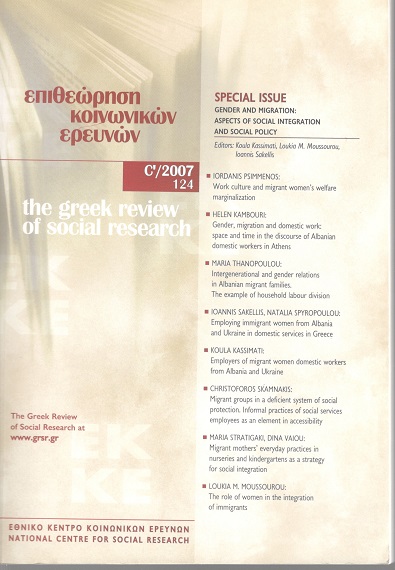The welfare orientations of immigrant domestic workers in Greece

Abstract
The language of welfare reflects not only life chances and redistributive practices that reduce income risks, but also occupational norms and welfare orientations. The article examines the case of immigrant domestic workers and how they relate to state welfare services. Through a reappraisal of the social significance of their job, it is argued that women workers are not only pushed but also pulled by a rising work culture which establishes a life into the margins of state welfare.1 The findings indicate that after a period of at least ten years in Greece and despite their legal entry or periodic legalisation in the country, their stable employment and their initial attempts to register with state welfare agencies, domestic workers are gradually distancing themselves from formal social insurance schemes. In addition to the existing analyses on the subject, it is suggested here that apart from work conditions, job customs and values seem also to reinforce welfare orientations that are more in line with paternalistic, informal and personality-based understandings and strategies of care.
1. The analysis reconsiders the findings based on a National Research (PYTHAGORAS I) project titled “Gender and Migrant Populations: aspects of Social Inclusion and Social Policy” implemented by the Centre of Social Morphology and Social Policy of the Panteion University of Social and Political Sciences under the general supervision of Emeritus Professors: K. Kassimati and L.M. Moussourou. For further details see The Greek Review of Social Research, 124, C/, 2007, as well as the analysis followed in Psimmenos and Skamnakis (2008), Psimmenos (2007) and Psimmenos (2010).
Article Details
- How to Cite
-
Psimmenos, I. (2011). The welfare orientations of immigrant domestic workers in Greece. The Greek Review of Social Research, 136, 225–248. https://doi.org/10.12681/grsr.51
- Section
- Articles

This work is licensed under a Creative Commons Attribution-NonCommercial 4.0 International License.
Authors who publish with this journal agree to the following terms:
- Authors retain copyright and grant the journal right of first publication with the work simultaneously licensed under a Creative Commons Attribution Non-Commercial License that allows others to share the work with an acknowledgement of the work's authorship and initial publication in this journal.
- Authors are able to enter into separate, additional contractual arrangements for the non-exclusive distribution of the journal's published version of the work (e.g. post it to an institutional repository or publish it in a book), with an acknowledgement of its initial publication in this journal.
- Authors are permitted and encouraged to post their work online (preferably in institutional repositories or on their website) prior to and during the submission process, as it can lead to productive exchanges, as well as earlier and greater citation of published work (See The Effect of Open Access).



